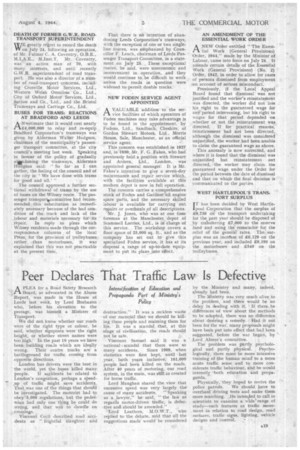Peer Declares That Traffic Law •ls Defective Intensification of Education
Page 21

If you've noticed an error in this article please click here to report it so we can fix it.
and Propaganda Part of Ministry's Policy APLEA for a Roa.d Safety Research Board, as advocated in the Alness Report, was made in the House of Lords last week, by Lord Brabazon who, before his elevation to the peerage, was himself a Minister of Transport.
We did not know whether our roads were of the right type or colour, he said, whether signposts were the right height, or whether street names were too high: In the past 10 years we have been building roads which are ideally wrong. Their centre tracks are a battleground for traffic coming from opposite directions.
London bus drivers were the best in the world, yet the buses killed many people. If accidents be related to London's congestion, perhaps a speed
,up of traffic might save accidents. That was one of the things that should be investigated. The motorist had to obey 5,000 regulations, but the pedestrian had only one thing he could do wrong, and that was to dawdle on
crossings.
Viscount Cecil described road accidents as " frightful 'slaughter and destruction." It was a reckless waste of our material that we should be killing these people and maiming them for life. It was a scandal that, at this stage of civilization, the roads should not be safe.
Viscount Samuel said it was a national scandal that there were so many accidents. Since 1909, when statistics were first kept, until 'last year, both years inclusive, 161,000 people had been killed on the roads. After 40 years of motoring, our road system, in the main, was still as created for horse traffic.
Lord Maughan shared the view that excessive speed was very largely the cause of many accidents. " Speaking as a lawyer," he said; " the law as regards motor-driven traffic, is defective and should be amended."
Lord Leathers, M.O.W.T., who replied to the debate, said that all the suggestions made would be considered by the Ministry and many, indeed, already had been.
The Ministry Was very much alive to the problem, and there would be no delay in dealing with it. • If there be differences of view about the methods to be adopted, there was no difference about desiring a remedy. Had it not been for the war, many proposals might have been put into effect that had been suggested, before the war began, by Lord Alness's committee.
The problem was partly psychological and partly physical. Psychologically, there must he more intensive training of the human mind to a more acute traffic sense and to more considerate traffic behaviour, and he would intensify both education and propaganda.
Physically, they hoped to revive the
police patrols. We should have to overhaul driving tests and make them more searching. He intended to call in scientists to examine a wide h range of study—such features as traffic move. ment •in relation to road design, road surfaces, traffic signs, lighting, vehicle
designs and control.




















































